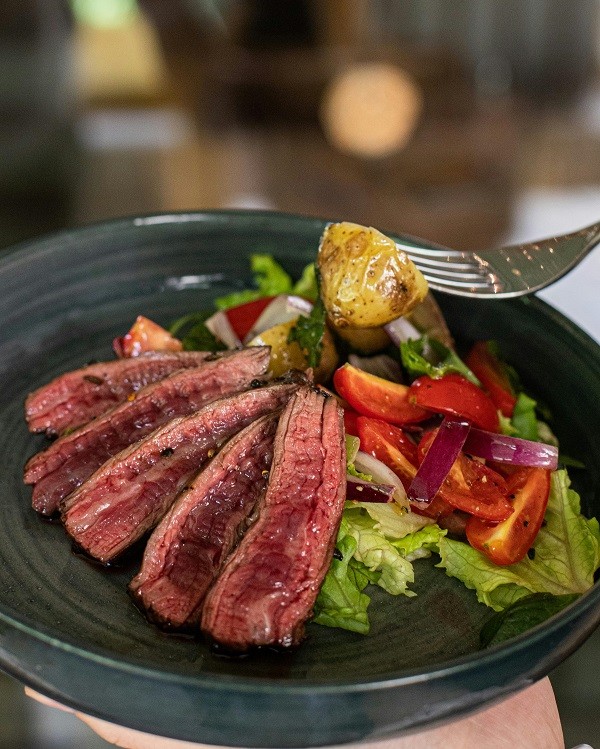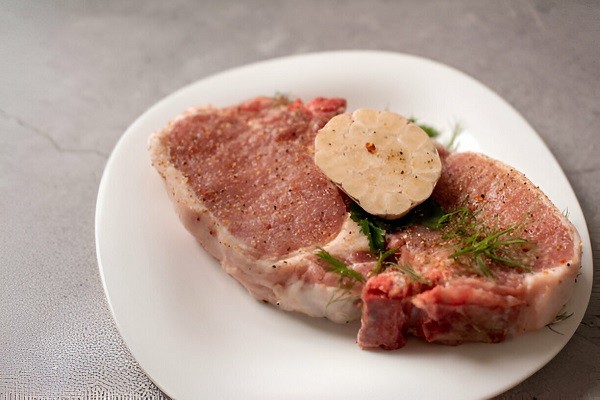Last Updated on January 6, 2025
Yes, you can eat pork while pregnant. However, it is important to ensure that it is cooked thoroughly to prevent any risk of foodborne illnesses.
During pregnancy, it is recommended to avoid consuming undercooked or raw meats to reduce the risk of infections such as toxoplasmosis or listeriosis. Pork, when cooked properly, can be a safe and nutritious source of protein for expecting mothers. It is advisable to consult with your healthcare provider or a nutritionist for personalized dietary recommendations during pregnancy.

Factors To Consider
Pregnant women should consider certain factors before consuming pork. It’s important to ensure that the pork is properly cooked to kill any harmful bacteria and to opt for lean cuts to minimize fat intake. Additionally, consulting with a healthcare professional is advised for individualized guidance.
Pregnancy is a precious time for every woman, as you embark on a journey of nurturing and nourishing a new life. Your dietary choices play a vital role in ensuring a healthy pregnancy, but often, certain foods can raise questions and uncertainties.
One such food is pork. Let’s explore the factors you should consider when deciding whether or not to include pork in your pregnancy diet.
Nutritional Value Of Pork
- Rich in protein: Pork is a great source of high-quality protein, which is essential for the growth and development of your baby.
- Iron content: During pregnancy, your body needs more iron to support the production of hemoglobin. Pork contains iron that aids in preventing anemia.
- B-vitamins: Pork is a good source of various B vitamins, including thiamin, riboflavin, niacin, and vitamin B12, which are crucial for fetal brain development and overall health.
Potential Risks Associated With Consuming Pork During Pregnancy
- Toxoplasmosis risk: Raw or undercooked pork carries the risk of toxoplasmosis, a parasitic infection that can harm the developing fetus. It is important to cook pork thoroughly to eliminate this risk.
- Foodborne illnesses: Pork can sometimes be contaminated with bacteria such as Salmonella or E. Coli, which can lead to foodborne illnesses. Proper handling, cooking, and storage are essential to minimize these risks.
Safe Ways To Include Pork In Your Pregnancy Diet
- Cook pork thoroughly: To eliminate any potential risks of foodborne illnesses, ensure that pork is cooked to the recommended internal temperature (at least 145°F or 63°C).
- Choose lean cuts: Opt for lean cuts of pork to minimize your intake of saturated fats. Trim any visible fat before cooking and try healthier cooking methods such as baking, grilling, or broiling.
- Practice proper food hygiene: Follow good food hygiene practices by washing your hands before and after handling raw pork, avoiding cross-contamination, and properly storing leftovers.
Remember, it is always advisable to consult with your healthcare provider or a registered dietitian to discuss your specific dietary needs during pregnancy. They can provide personalized guidance and recommendations based on your circumstances.
As you make decisions about your pregnancy diet, keep in mind that maintaining a balanced and varied diet is key. Including a wide range of nutrient-rich foods, along with suitable cooking practices, will help ensure the well-being of both you and your growing baby.

Nutritional Benefits Of Pork
Pork offers numerous nutritional benefits during pregnancy, providing essential nutrients like protein, iron, and B vitamins which support the baby’s development. With proper cooking to eliminate any potential risks, pork can be safely consumed as part of a balanced diet.
Essential Nutrients Found In Pork:
- Protein: Pork is a great source of high-quality protein, which plays a crucial role in the development of your baby’s cells and tissues.
- Iron: Iron is an essential mineral during pregnancy as it helps in the production of hemoglobin and prevents anemia. Pork contains heme iron, which is more easily absorbed by the body compared to non-heme iron from plant sources.
- Vitamin B12: Pork is rich in vitamin B12, a nutrient necessary for the formation of red blood cells and the healthy development of the baby’s nervous system.
- Zinc: This mineral is important for the growth and development of the baby’s brain and immune system. Pork is a good source of zinc.
- Selenium: Pork provides selenium, an antioxidant that supports a healthy immune system and helps protect against oxidative stress.
- Choline: Pork is also a good source of choline, a nutrient that aids in the baby’s brain development and helps prevent neural tube defects.
Importance Of Protein And Iron During Pregnancy:
- Protein: During pregnancy, your body needs extra protein to support the growth of your baby. Protein is essential for the development of organs, muscles, and tissues.
- Iron: Iron is crucial for maintaining healthy blood levels and preventing iron deficiency anemia, which is common during pregnancy. Anemia can lead to fatigue, weak immunity, and complications for both the mother and baby.
How Pork Can Fulfill These Nutritional Needs:
- Protein: Pork is an excellent source of protein, providing all the essential amino acids required for the healthy growth of your baby. Including pork in your pregnancy diet can help you meet your increased protein requirements.
- Iron: As mentioned earlier, pork contains heme iron, which is easily absorbed by the body. Consuming pork can help prevent iron deficiency and support healthy blood production during pregnancy.
- Vitamin B12: Pork is one of the best dietary sources of vitamin B12, which is essential for the development of the baby’s nervous system. Including pork in your diet can help ensure you meet your vitamin B12 needs during pregnancy.
- Zinc: Pork is rich in zinc, an important mineral for the growth and development of your baby’s brain and immune system. Consuming pork can help support these vital processes.
- Selenium: The selenium content in pork can contribute to a healthy immune system for both the mother and the baby. Adequate selenium intake during pregnancy is crucial for optimal health.
- Choline: Pork is a good source of choline, which aids in the development of the baby’s brain and helps prevent neural tube defects. Including pork in your pregnancy diet can help ensure you get enough choline for the healthy growth of the baby.
Incorporating lean cuts of pork into a balanced pregnancy diet can provide valuable nutrients like protein, iron, vitamin B12, zinc, selenium, and choline, helping support the healthy development and well-being of both the mother and the baby. Remember to consult with your healthcare provider and consume pork in moderation, ensuring it is properly cooked to reduce any potential risks.
Potential Risks Of Eating Pork While Pregnant
Pregnant women should be cautious when consuming pork due to potential risks. It is essential to ensure proper cooking and hygiene to avoid foodborne illnesses and infections that could harm both the mother and the baby.
Pregnancy is a special time when you need to pay extra attention to your diet. While pork is a popular meat enjoyed by many, there are some potential risks associated with consuming it during pregnancy. In this section, we will explore the concerns related to foodborne illnesses, specific bacteria to be cautious of, and proper cooking techniques to minimize these risks.
Concerns Related To Foodborne Illnesses
It’s essential to be aware of the potential risks of foodborne illnesses while pregnant. Here are some key points to consider:
- Consuming undercooked or raw pork increases the risk of contracting foodborne illnesses like Salmonella, E. Coli, and Listeria.
- These illnesses can cause severe complications for both the mother and the unborn baby, including miscarriage, premature birth, and developmental problems.
Specific Bacteria To Be Cautious Of
Certain bacteria are particularly concerning when it comes to pork consumption during pregnancy. Take note of the following:
- Salmonella: This bacteria is commonly found in pork and can cause food poisoning. Symptoms include diarrhea, vomiting, and abdominal pain.
- Listeria: Although rare, Listeria infection can lead to a severe illness called listeriosis. Pregnant women are at higher risk of Listeria infection and may experience flu-like symptoms, fever, and even miscarriage or stillbirth if infected.
- Toxoplasma: While not a bacteria, this parasite is often found in undercooked pork and can lead to toxoplasmosis. Pregnant women infected with Toxoplasma may experience flu-like symptoms or pass the infection to their baby, causing serious health issues.
Proper Cooking Techniques To Minimize Risks
To minimize the risks associated with pork consumption during pregnancy, it is vital to ensure that pork is cooked thoroughly. Here are some cooking techniques to consider:
- Cook pork to an internal temperature of 145°F (63°C) using a meat thermometer.
- Avoid eating pork that is pink or has any traces of blood.
- Ensure that all pork products, including ground pork and sausages, are cooked through completely.
- Use separate cutting boards and utensils for raw and cooked pork to avoid cross-contamination.
- Wash hands thoroughly after handling raw pork.
By following these proper cooking techniques and being vigilant about food safety, you can significantly reduce the risks associated with consuming pork during pregnancy. Remember to prioritize your health and that of your unborn baby by making informed decisions about your diet.
Stay tuned for the next section, where we will discuss the nutritional benefits of pork during pregnancy and provide some delicious and safe pork recipe ideas for you to enjoy.
Safe Pork Consumption Guidelines
Pregnant women can safely consume pork by following these guidelines for safe pork consumption during pregnancy. Ensure proper cooking, avoid undercooked or raw pork, and follow all food safety precautions to minimize the risk of any potential harm to you and your baby.
Ensuring the pork is cooked thoroughly:
- Cook pork to an internal temperature of 145°F (63°C) to kill any harmful bacteria.
- Use a food thermometer to accurately measure the temperature.
- Avoid eating undercooked or raw pork, as it may contain parasites or bacteria that can harm the baby.
- Cook ground pork until it is no longer pink and the juices run clear.
Proper handling and storage of pork:
- When purchasing pork, check the packaging for any signs of damage or leaks.
- Keep raw pork separate from other foods to prevent cross-contamination.
- Store pork in the refrigerator at a temperature below 40°F (4°C) to inhibit bacterial growth.
- Use or freeze pork within 2-3 days of purchase to ensure its freshness.
Expert recommendations on portion sizes:
- It is important to consume pork in moderation during pregnancy.
- Opt for lean cuts of pork, such as tenderloin or loin chops, which are lower in fat.
- Limit your portion size to 2-3 ounces (56-85 grams) of cooked pork per serving.
- Include a balanced variety of other protein sources in your diet to meet your nutritional needs.
Remember, always consult with your healthcare provider before making any significant changes to your diet during pregnancy. It’s important to prioritize the safety and well-being of both you and your baby.
Alternative Options For Pregnant Women
Discover alternative options for pregnant women and explore the topic of whether it is safe to consume pork during pregnancy. Learn about the potential risks and benefits to make an informed decision for a healthy pregnancy.
Pregnancy is a time when many women become more cautious about their dietary choices. While some may wonder if they can still enjoy pork during pregnancy, it’s important to consider alternative options that can provide the same nutritional benefits. Here are some vegetarian alternatives to pork that can ensure a well-rounded diet for pregnant women:
- Tofu: This versatile soy-based product is an excellent meat substitute. It can be marinated, stir-fried, or used as a filling for dishes such as tofu scramble or stuffed tofu.
- Tempeh: Made from fermented soybeans, tempeh is known for its savory taste and chewy texture. It can be sliced, grilled, or used as a protein-rich ingredient in various recipes.
- Seitan: Also known as wheat meat, seitan has a similar texture to meat and can be used in stir-fries, stews, and sandwiches. It is high in protein and adds a savory flavor to dishes.
Other sources of protein and iron for a well-rounded diet:
Maintaining a balanced diet during pregnancy is essential to support your baby’s growth and development. Here are additional sources of protein and iron that can contribute to a healthy pregnancy:
- Legumes: Lentils, chickpeas, and beans are excellent plant-based sources of protein and iron. They can be included in soups, salads, stews, or even used to make vegetarian burgers.
- Nuts and seeds: Almonds, walnuts, chia seeds, and flaxseeds are nutritious options that provide protein, healthy fats, and essential minerals. They can be added to smoothies, cereals, or eaten as a snack.
- Quinoa: A complete protein source, quinoa is also rich in iron and fiber. It can be used as a base for salads, grain bowls, or as a side dish.
- Leafy greens: Spinach, kale, and Swiss chard are packed with iron and other essential nutrients. They can be sautéed, added to soups, or used in salads.
- Whole grains: Brown rice, oats, and whole wheat bread are excellent sources of complex carbohydrates, fiber, and some protein. They can be incorporated into meals as the main component or as a side dish.
Balancing your nutritional needs without consuming pork:
Although pork can be a part of a healthy diet, there are plenty of alternatives available to ensure pregnant women obtain the necessary nutrients without consuming pork. By exploring vegetarian options like tofu, tempeh, and seitan, along with incorporating other sources of protein and iron like legumes, nuts, seeds, quinoa, leafy greens, and whole grains, pregnant women can maintain a balanced and nutritious diet for a healthy pregnancy.
Remember to consult with a healthcare provider or a nutritionist to ensure you’re meeting your specific dietary needs during this special time.
Expert Insights And Recommendations
Pregnant and wondering about consuming pork? Get expert insights and recommendations regarding the safety of eating pork during pregnancy.
Eating a healthy and balanced diet during pregnancy is crucial for the well-being of both the expectant mother and the growing baby. When it comes to consuming pork, there are some opinions and guidelines provided by healthcare professionals and reputable organizations.
Let’s take a closer look:
Opinions Of Healthcare Professionals On The Topic
- Some healthcare professionals believe that moderate consumption of properly cooked pork is safe during pregnancy.
- They suggest that pregnant women should focus on purchasing fresh and high-quality pork from reliable sources.
- It is advised to avoid consuming undercooked or raw pork to reduce the risk of foodborne illnesses.
Guidelines From Reputable Organizations
- Reputable organizations such as the American Pregnancy Association and the U.S. Food and Drug Administration (FDA) provide guidelines for safe pork consumption during pregnancy.
- These organizations recommend that pregnant women consume cooked pork that has reached an internal temperature of 145°F (63°C).
- It is essential to use a food thermometer to ensure the pork is cooked to the appropriate temperature.
- Leftover pork should be refrigerated promptly and consumed within a couple of days to maintain food safety.
Research-Backed Suggestions For Safe Pork Consumption During Pregnancy
To minimize the potential risks associated with consuming pork during pregnancy, it is advisable to follow these research-backed suggestions:
- Choose lean cuts of pork such as tenderloin and loin chops that contain lesser amounts of fat.
- Trim visible fat before cooking to reduce the intake of saturated fats.
- Cook pork thoroughly until it is no longer pink in the center and the juices run clear.
- Avoid consuming processed pork products that may contain high levels of sodium and additives.
- Incorporate other protein sources such as poultry, fish, beans, and tofu into your diet to add variety and nutrients.
Remember, it is always wise to consult with your healthcare provider or a registered dietitian for personalized advice on nutrition during pregnancy. By making informed choices and following these recommendations, you can enjoy pork safely while nurturing your body and your baby.
Frequently Asked Questions
What Meat Can You Not Eat When Pregnant?
Avoid eating raw or undercooked meat during pregnancy to prevent the risk of foodborne illnesses.
Can You Eat Bacon While Pregnant?
Yes, you can eat bacon while pregnant. Just ensure it is cooked thoroughly to avoid any risks.
Can You Eat Pork Beef When Pregnant?
Yes, you can eat pork and beef while pregnant.
Can You Eat Pork Fat When Pregnant?
Yes, you can eat pork fat while pregnant.
Can You Eat Pork While Pregnant?
Pork can be safely consumed during pregnancy as long as it’s cooked properly to avoid any risk of foodborne illnesses.
Conclusion
It is safe to eat pork while pregnant as long as it is cooked thoroughly. Pork is a good source of protein and essential nutrients that are important during pregnancy. However, it is crucial to ensure that the pork is prepared properly to minimize the risk of foodborne illnesses.
It is recommended to cook pork until it reaches an internal temperature of 145°F (63°C) to kill any harmful bacteria. Additionally, pregnant women should avoid consuming undercooked or raw pork products, such as sausage or cured ham. By following these guidelines and practicing good food safety measures, pregnant women can enjoy pork as part of a healthy and balanced diet.
As with any dietary decision during pregnancy, it is always best to consult with a healthcare professional for personalized advice.











